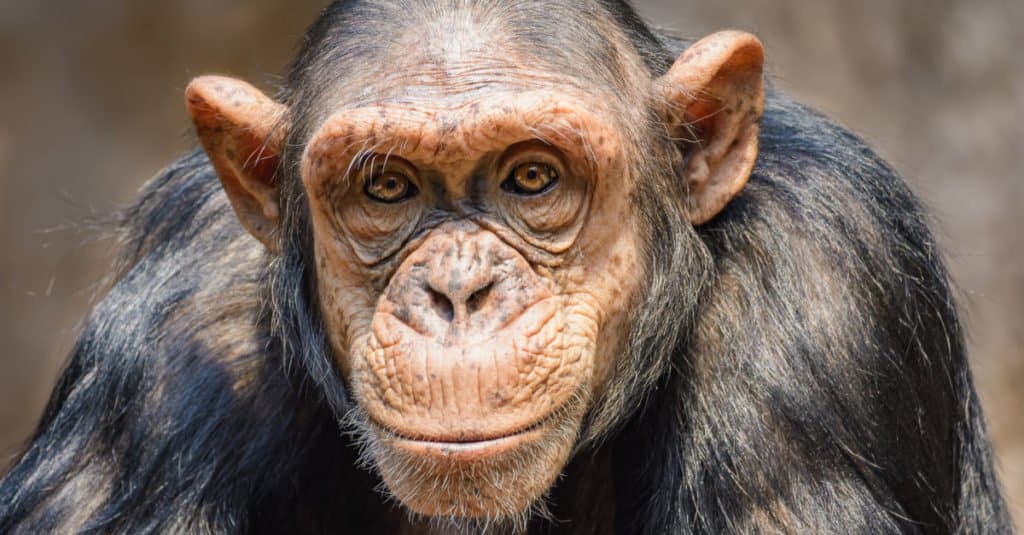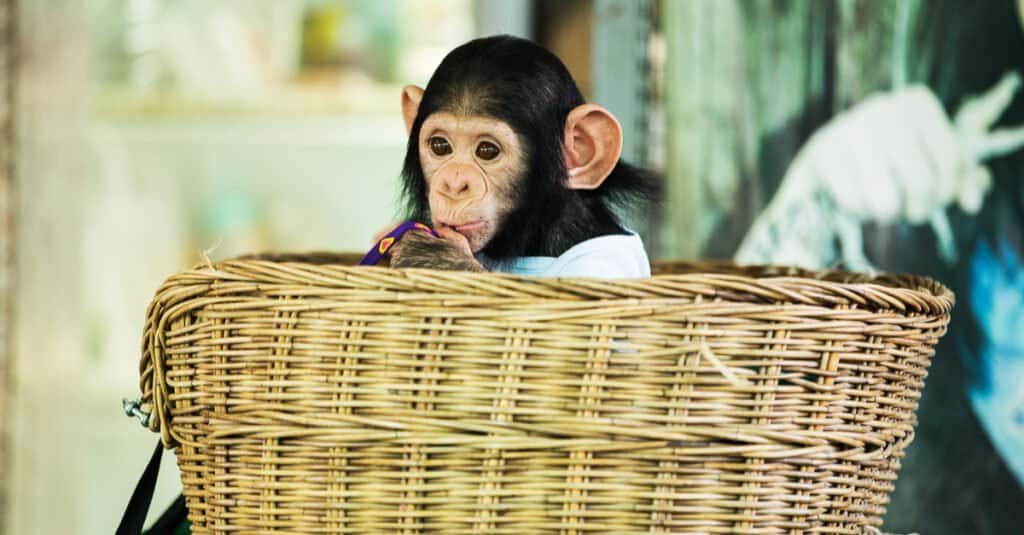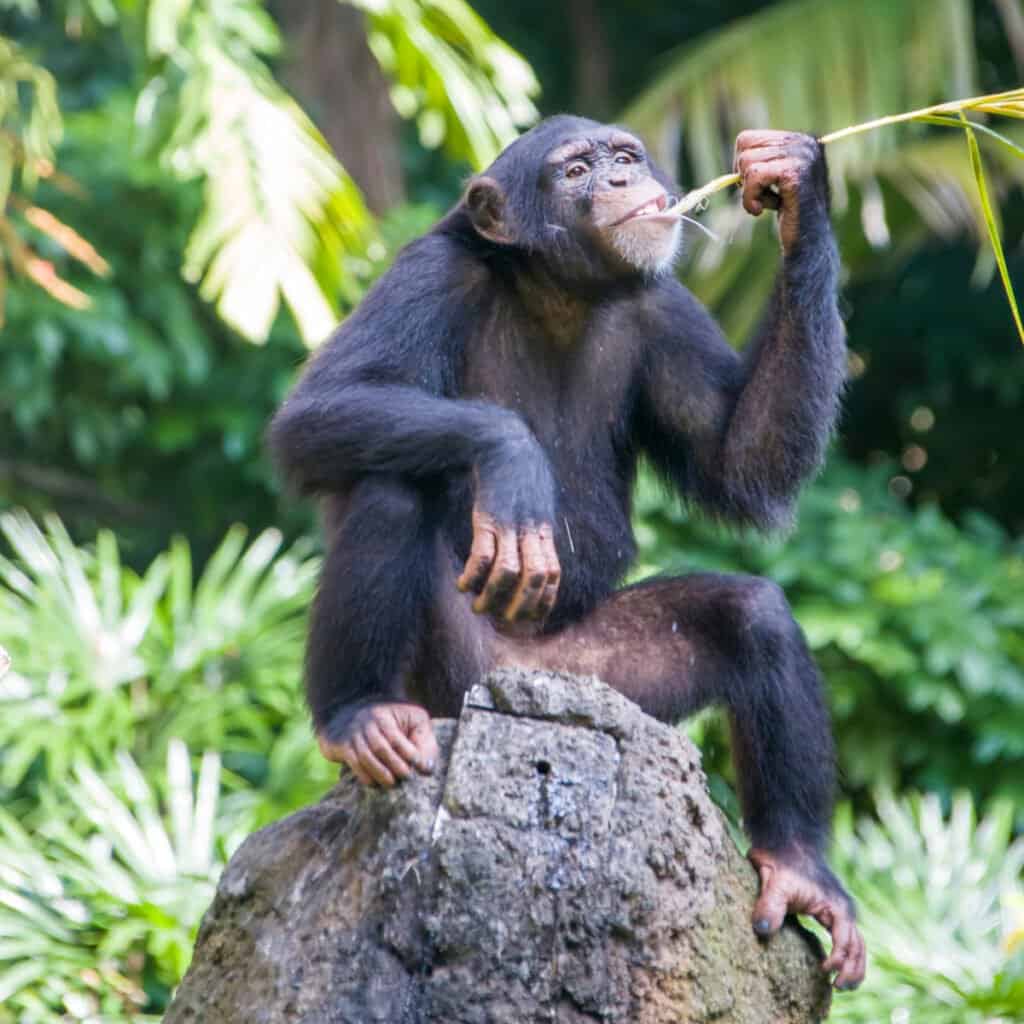As much as chimpanzees’ actions, gestures, and personalities are mostly the same as those of humans, they also have a similar kind of diet. Tropical rainforests, lowland and mountain forests, and other habitats are home to chimpanzees in western and central Africa. Chimpanzees eat a variety of foods, just like humans. That means they consume diverse vegetarian foods in addition to animal products.
For chimpanzees, it is never hard to look for food, because they consume almost anything and everything! Chimps eat approximately 80 different items, according to scientists. Feeding is usually a solitary activity, but chimps have been known to forage for food in large groups. This raises the question, just what exactly do chimpanzees eat?
What Do Chimpanzees Eat?

Chimpanzees eat berries, fruits, figs, and birds.
©Thorsten Spoerlein/Shutterstock.com
Chimpanzees are generally omnivores like humans and eat fruits, berries, nuts, termites, and birds.
With chimpanzees being omnivores that will eat both plant and animal matter, we’ll examine the plants and animals they eat separately. First, here are some of the plants that chimpanzees prefer to eat in their diet:
- Figs
- Fruits
- Berries
- Mushrooms
- Nuts
- Seeds
- Tree bark
- Flowers and leaves
- Palm Wine
- Medicinal Plants
Beyond the fact that they are nutritious and delicious, figs account for nearly half of the chimpanzee’s diet, and they serve as an excellent source of energy.
Among the fruits that chimpanzees consume are mangoes, bananas, watermelons, and apples. Because chimpanzees are unable to source out-of-season fruit, they are forced to eat whatever is in season. When there is a scarcity for fruit, chimpanzees will prefer flowers, leaves, seeds, or tree bark to supplement their nutritional intake. They, on the other hand, prefer fruit.
What Animals Do Chimpanzees Eat?
Chimpanzees were historically believed to be herbivores, meaning they only ate plants. However, a young Dr. Jane Goodall was the first to document cooperative hunting among chimpanzees while working in Gombe, Tanzania, in the early 1960s. She has witnessed firsthand how the wild mammals were working altogether in order to capture and eat large animals. They were soon discovered eating insects too, such as termites, and then later on more meat and other animal products. The animals and meat products chimpanzees prefer to eat include:
- Honey
- Milk
- Eggs
- Insects
- Termites
- Red colobus monkeys
- Honey bees
- Driver ants
- Beetle grubs
- Birds
- Bush babies
- Small antelopes
- Flying squirrels
- Tree pangolins
Meat and other animal products can account for as much as 6% of a chimpanzee’s total caloric intake, while insects like ants and termites take up approximately 4% of their diet. It is noteworthy that successful hunters frequently share a portion of their kill with other group members in response to a variety of beseeching behaviors displayed by other hunters.
Do All Chimpanzees Eat the Same Food?
Chimpanzees do not consume figs if there are no fig trees in the area. Likewise, chimps do not consume mammal meat if there are no monkeys or duikers around. In a research about chimp diets based on carbon and nitrogen isotopes, researchers discovered that some individuals appear to eat only plants, while others appear to consume foods that are a little higher up the food chain. In order to survive, some species must consume a specific combination of foods, but chimps do not belong to those groups.
What Do Baby Chimpanzees Eat?

Since baby chimpanzees can’t eat solid food, they rely on their mother’s milk.
©subin pumsom/Shutterstock.com
Just like humans and any other mammals, baby chimpanzees rely on their mother’s milk. Infant chimpanzees nurse for at least five years and remain with their mothers for even longer periods of time, during which time they learn to care for younger siblings. Orphaned chimpanzees are frequently malnourished and in desperate need of food and medical attention. Infant chimpanzees at sanctuaries are fed specially formulated milk until they are old enough to eat solid food of their own accord.
What Medicinal Plants Do Chimpanzees Eat?
Chimpanzees have an intuitive understanding of the medicinal properties of various plants. A plant known as Aspilia mossambicensis, which aids in the removal of parasites from chimpanzees’ digestive systems, has been observed being consumed by these mammals in Gombe Stream National Park. Additionally, chimpanzees have been observed consuming elm bark, which combats bacterial infections, Cordia flower stems, which lowers the risk of tuberculosis, soil, which contains anti-malaria minerals, and unripe figs, which possess de-worming abilities. Chimpanzees have a typical lifespan of 30-40 years in the wild, but in captivity can live much longer. The oldest chimpanzee on record was believed to have been 78-84 years old, so when well cared for chimpanzees can reach ages that rival humans!
How do Chimpanzees Hunt for Food?

Chimpanzees will use tools to hunt for ants and termites.
©Danny Ye/Shutterstock.com
Some foods for the chimps need to be cooked or prepared before they can be consumed, while other foods are prepared with the aid of tools. For example, they open nuts with stones and branches. Using the stone or the branch, the nut is placed on a firm surface, such as a tree’s root, and then broken open with the stone or branch.
Chimpanzees use a different tool to consume ants. They usually take a twig, break it off at the appropriate length, and use this to hold the ant nest in place while they work. Some ants make their way up the ant rod, only to be slurped up by the chimpanzee at the top.
The photo featured at the top of this post is © Afandi Teguh Afriyanto/Shutterstock.com
Thank you for reading! Have some feedback for us? Contact the AZ Animals editorial team.






